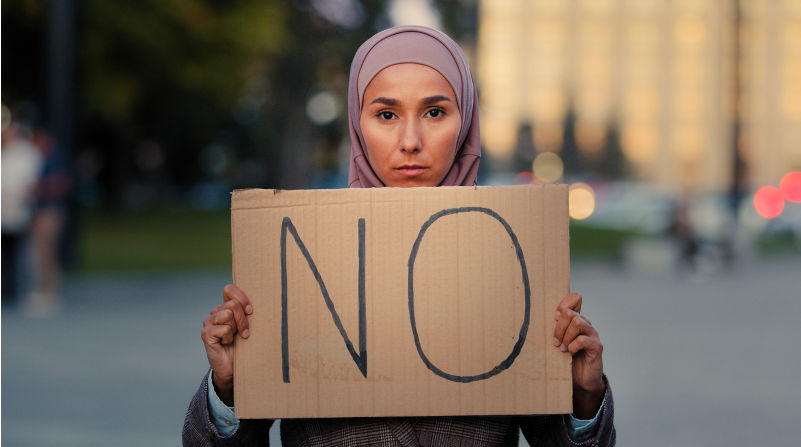Islamophobia reports are not enough
September 17, 2025
For decades, Muslims in Australia have been asked to give evidence, to share their trauma, and to trust that government inquiries will bring change.
The recently released National Response to Islamophobia report is the latest in a long line of reviews. It runs hundreds of pages, sets out more than 50 recommendations, and calls for a “whole-of-society” approach. Yet for many Muslim communities, the refrain remains the same: enough reviews.
Reports do not protect women from having their hijabs ripped off on trams. They do not shield children from playground taunts that they should be killed. They do not prevent mosques from being firebombed or graffitied with Christchurch references. These incidents are not isolated. They are part of a pattern, documented in national studies, inquiries and registers for decades.
A chasm between reports and reality
The new report details the structural drivers of Islamophobia: discriminatory counter-terrorism laws, entrenched employment barriers, securitisation, and the “suspect community” framing that has long cast Muslims as threats from within. It recognises the systemic harassment of Palestinian and Arab students, the gendered violence faced by Muslim women and the complicity of institutions in censorship and intimidation.
But for communities, this is not news. It is their experience. The constant cycle of consultations and frameworks is exhausting. The chasm between the reality of Islamophobia and the measured policy language of government reports grows wider each year. Public perception is shaped to deny that reality. A January poll found that only 9% of Australians believed Islamophobia had increased since October 2023, despite evidence of a sharp rise in incidents.
This denial is cultivated. Politicians downplay Islamophobia, some even deny it exists. The media provides selective outrage – amplifying antisemitic attacks, while Islamophobic assaults receive muted coverage or none at all. The effect is a society where Muslim trauma is minimised and sidelined, while the perpetrators of hate remain unchecked.
Zero accountability
At the heart of the problem is accountability – or the lack of it. No politician has ever been censured for fuelling Islamophobic hate. Media outlets are rarely held responsible for headlines and commentary that demonise Muslims and Arabs. Even as the report itself acknowledges the “social licence to hate” granted by divisive political rhetoric and sensationalist reporting, it stops short of recommending mechanisms of enforcement.
The result is a hollow cycle: communities provide evidence, governments nod gravely, recommendations are tabled and then nothing meaningful changes. The recommendations fade into the bureaucratic ether, leaving Muslim communities to continue living with the consequences.
Islamophobia as a colonial project
Islamophobia in Australia is not just interpersonal prejudice. It is structural and systemic. It is embedded in law, policy and the national story. To frame it as a social cohesion challenge or a matter of “community relations” is to miss its roots.
Islamophobia is inseparable from the colonial project that underpins this nation. The same structures that have long dispossessed and dehumanised First Nations peoples are at work in the surveillance, exclusion and racialisation of Muslim communities. The insistence that Muslims must prove their loyalty, condemn violence they did not commit and wait patiently for recognition is a continuation of colonial control.
This is why reports, however comprehensive, often fail to shift the ground. They are written within the very frameworks that perpetuate the problem. Without a willingness to dismantle the structural drivers of Islamophobia — including discriminatory security laws, media vilification, and unchecked racism in Parliament — the cycle will continue.
Complicity in plain sight
The government’s response to the recent neo-Nazi marches is a case in point. While Palestinian and Muslim protesters have been met with surveillance, intimidation and vilification, neo-Nazis were defended on the grounds of free speech. The prime minister’s refusal to unequivocally denounce fascists, while communities protesting genocide are demonised, exposes the double standard at the heart of Australia’s approach.
This selective defence of rights is not neutrality. It is complicity. It sends a clear message: some forms of hate will be tolerated, even protected, while others — particularly Muslim and pro-Palestinian expression — will be silenced.
Beyond frameworks
The National Response to Islamophobia offers more than 50 recommendations across government portfolios, from education and policing to media and sport. These include inquiries into discriminatory laws, protections against religious discrimination and expanded funding for community safety. All are important steps. But they will remain words on paper unless backed by political will.
What is needed is not another framework, but courage. Governments must legislate accountability: sanction parliamentarians who incite hate, enforce media responsibility for racist coverage and strengthen protections against vilification. Universities and workplaces must be held to account when they fail to protect Muslim staff and students. Law enforcement must address its role in perpetuating systemic discrimination.
Above all, governments must name the problem honestly: Islamophobia is not an aberration but a structural feature of Australian society, one that intersects with colonialism, racism and global geopolitics.
A moment for truth
For too long, Muslims have been told to wait. To provide evidence, to participate in consultations, to trust that change will come. Each new report repeats the cycle.
Australia does not need more reviews. It needs political leaders who are prepared to confront Islamophobia with the same urgency given to other forms of racism. It needs a government willing to challenge the complicity of its own institutions, media and laws. And it needs accountability – real consequences for those who incite, enable or excuse Islamophobic hate.
Until then, Muslim communities will continue to carry the weight of a reality that governments acknowledge only in reports, but rarely in action.
The views expressed in this article may or may not reflect those of Pearls and Irritations.

